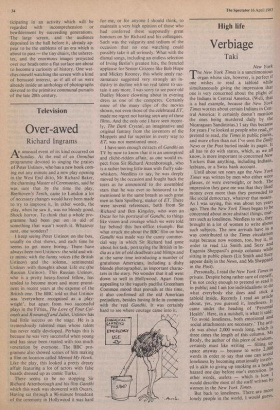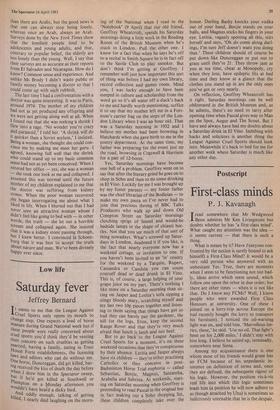High life
Verbiage
Taki
New York
The New York Times is a sanctimonious organ whose size, however, is perfect if one wishes to read a tabloid while simultaneously giving the impression that one is very concerned about the plight of the Indians in Central America. (Well, that is a bad example, because the New York Times worries about certain Indians in Cen- tral America: it certainly doesn't mention the ones being murdered daily by the Nicaraguan Sandinistas.) I say this because for years I've looked at people who read,,or pretend to read, the Times in public places, and more often than not I've seen the DailY News or the Post buried inside its pages. It all has to do with status, which, as we all know, is more important to concerned New Yorkers than anything, including Indians, lesbians, or a Swiss bank account. Until about ten years ago the New York Times was written by men who either wore glasses, or were overweight, or both. The impression they gave me was that they liked money even more than they pretended to like social democracy, whatever that means. As I was saying, this was about ten years ago. Then the New York Times began to be concerned about more abstract things, mat- ters such as loneliness. Needless to say, they brought in a lot of women to write about such subjects. The new arrivals have in a way contributed to the Times circulation surge because now women, too, buy it, ih order to read. Liz Smith and Suzy and Eugenia Sheppard's gossip columns while sitting in public places (Liz Smith and SUZY appear daily in the News, and Ms Sheppard in the Post). Personally, I read the New York Times in private. Despite being rather sure of myself, I'm not cocky enough to pretend to read it in public; and I am too individualistic to do what everybody else does and stick a tabloid inside. Recently I read an article about, yes, you guessed it, loneliness. It came under the heading of 'Personal Health'. Here, in a nutshell, is what it said: 'To avoid loneliness, both emotional an social attachments are necessary.' The arti- cle was about 2,000 words long, which is three times the length of this column. Ms Brody, the author of this piece of wisdom, certainly must like writing — filling UP space anyway — because to write 2,0c)0 words in order to say that one can avoid loneliness by becoming emotionally involv- ed is akin to giving up smoking as a health hazard one day before one's execution. In other words, useless — which is how I would describe most of the stuff written bY women in the New York Times.
But back to loneliness. There are more lonely people in the world, I would guess,
than there are Arabs, but the good news is that one can always stop being lonely, Whereas once an Arab, always an Arab. Surveys done by the New York Times show that the loneliest people tend to be adolescents and young adults, and that, contrary to popular belief, the elderly are less lonely than the young. Well, I say that their surveys are as accurate as their reports from El Salvador and Nicaragua. How do I know? Common sense and experience. And unlike Ms Brody I didn't waste public or family money becoming a doctor so that I could come up with such rubbish.
The last time I had a confrontation with a doctor was quite interesting. It was in Paris, around 1974. The mother of my children had not as yet produced any offspring and we were not getting along well at all. When I found out that she was seeking a shrink I flew into a rage. 'No wonder you're crazy and paranoid,' I told her. 'A shrink will do it quicker than a Soviet asylum,' I insisted. Being a woman, she thought she could con- vince me by making me meet her guru. I agreed, knowing full well that the shrink Who could stand up to my basic common sense had not as yet been conceived. When I entered her office — yes, she was a woman — she took one look at me and collapsed. I assumed this was normal until the future mother of my children explained to me that the doctor was suffering from kidney stones. When the poor woman recovered She began interrogating me about what I liked in life. When I blurted out that I had never seen an attractive woman whom I didn't feel like going to bed with — in other words, the truth — she let out a horrible scream and collapsed again. She insisted that it was a kidney stone passing through, but I knew better. I convinced la Schoen- burg that it was best to accept the truth about nature and man. We've been divinely happy ever since.











































 Previous page
Previous page